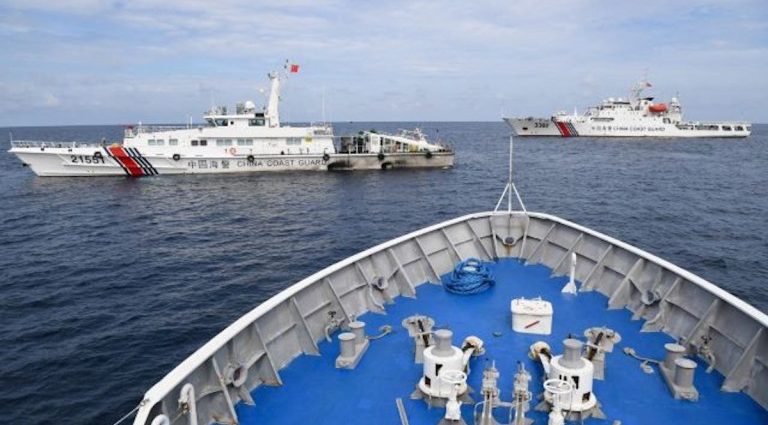Following its predecessors, the Biden administration threatened to go to war with China after a Chinese coast guard vessel scraped a Philippines ship on a resupply mission near a shoal in the South China Sea.
Shortly thereafter, a Chinese fighter flew within 10 feet of a US bomber above the disputed tract of reefs and islets.
While US-China relations appear to be emphasizing diplomacy, with Chinese Foreign Minister Wang Yi’s visit to Washington and US representation at China’s Xiangshan Forum, its premier defense conference, a possible conflict over sandbars is likely top of mind.
However, the US pledge to go to war with a nuclear-armed China over largely uninhabited rocks and reefs – stemming from post-colonial disputes – is not credible, harms US interests and creates unnecessary regional tensions.
The United States going to war with China to defend the Philippines’ claims to rocks and reefs in the South China Sea is not credible. These islets are largely uninhabited – save for a grounded ship Manilla uses to press its claims – and strategically irrelevant.

Although trillions of dollars in global trade traverse these waters annually, an overwhelming majority goes to China. Additionally, ships are moving objects, they can change their course. Though more expensive, merchant ships can often go around the South China Sea to reach destinations in Southeast and Northeast Asia, as well as the United States.
Strategically, controlling the small bits of territory makes little difference. While they can serve as military outposts and bases, these locations are highly vulnerable to missile bombardments. Resupplying these military installations would be difficult, as supply vessels would have to worry about missile and submarine attacks.
Their size also makes them poor staging grounds for wider invasions. If China were to invade the Philippines, it would unlikely be able to muster enough troops on the rocks for a successful landing.
More importantly, the risks to US survival are too high and opportunity for tangible gains too little for Washington to be serious about its threat to defend disputed rocks and reefs.
America is highly unlikely to risk nuclear war or an equally deadly conventional war over a single Filipino ship or plane – let alone a small group.
The United States did not declare war on North Korea when it sank a South Korean ship and bombarded an island, nor did Washington mobilize when a Chinese boat – likely linked to China’s government – collided with two Japanese coast guard vessels in 2010.
Such moves would set negative precedents for US allies, signaling that Washington is willing to back their territorial claims – even potentially irredentist and imperialist ones – and disproportionality at the expense of US interests.
Just like the Philippines, China cares far more about its South China Sea claims than the United States for nationalist and territorial integrity reasons. The islets are also an essential pillar of China’s Century of Humiliation narrative and factor into the Chinese Communist Party’s legitimacy.
As such, the disputed territory is part of Beijing’s “core interests” – national interests in which China will use force to defend. Moreover, China’s geographic proximity – despite the US military presence in the Philippines – gives it the edge.
Instead of focusing on defending rocks and reefs in the Western Pacific, Washington should reorient its alliance with Manilla to be purely defensive and aimed at protecting the Philippines’ home islands. The new policy could enhance military training, defensive planning and coordination, and defensive arms sales centered on the Filipino homeland.
At the same time, Washington should publicly and privately signal that America would only come to the Philippines’ aid if one of its main islands is attacked unprovoked. This would likely restrain the Philippines from risking activities that could embroil it in a conflict with China and, therefore, reduce regional tensions.
Further underscoring the purely defensive nature of the alliance, Washington should also rule out using its bases in the Philippines as a staging ground to defend Taiwan. Manilla would not only agree with this, but it would be in the Philippines’ interest. It could help protect them from becoming collateral damage from a Chinese invasion of Taiwan.

This would also help reduce tensions in the South China Sea – as closer US-Philippines defense ties are likely contributing to increased Chinese assertiveness. Southeast Asian nations would also appreciate reduced regional tensions to focus on improving their people’s livelihoods, which would also improve America’s standing in the economically important region.
Washington’s commitment to go to war over some rocks and reefs in the South China Sea lacks credibility. The area is simply not economically or strategically important enough to risk US survival.
Transforming the Philippines alliance into a purely defensive one would better secure American interests, improve its credibility, and reduce regional tensions. America should act now before it’s too late.
Quinn Marschik is a contributing fellow at Defense Priorities.

